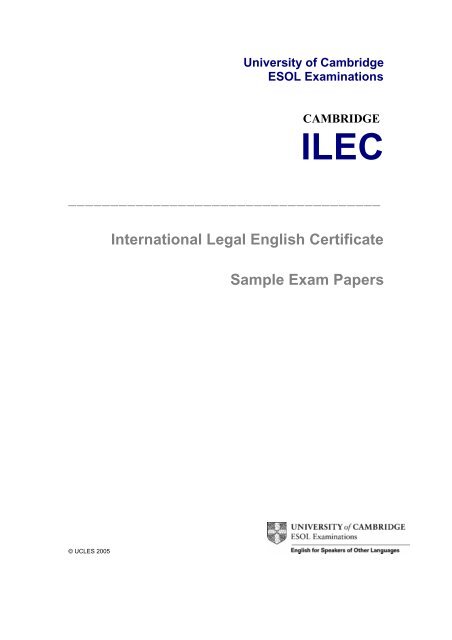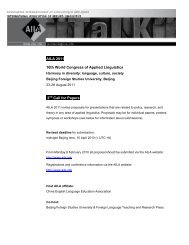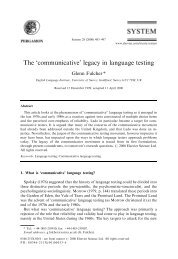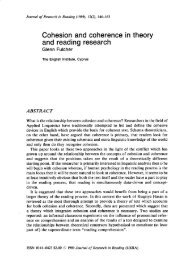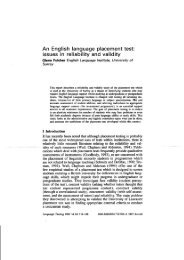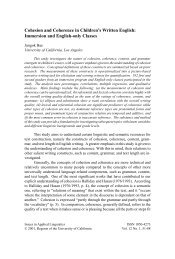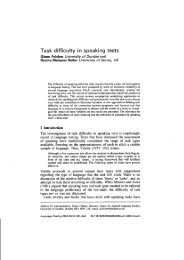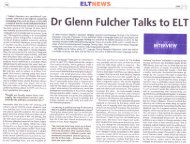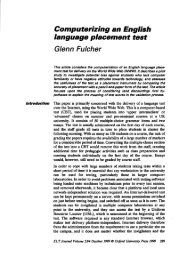International Legal English Certificate Sample Exam Papers
International Legal English Certificate Sample Exam Papers
International Legal English Certificate Sample Exam Papers
- No tags were found...
You also want an ePaper? Increase the reach of your titles
YUMPU automatically turns print PDFs into web optimized ePapers that Google loves.
University of CambridgeESOL <strong>Exam</strong>inationsCAMBRIDGEILEC_____________________________________<strong>International</strong> <strong>Legal</strong> <strong>English</strong> <strong>Certificate</strong><strong>Sample</strong> <strong>Exam</strong> <strong>Papers</strong>© UCLES 20051
ContentsILEC ReadingGeneral Information…………………………………. 5Outline……………………………………………….... 6<strong>Sample</strong> Question Paper…………………………….. 7<strong>Sample</strong> Question Paper Answer Key……………… 20ILEC WritingGeneral Information…………………………………. 21Outline………………………………………………… 21<strong>Sample</strong> Question Paper…………………………….. 23ILEC ListeningGeneral Information…………………………………. 30Outline………………………………………………… 30<strong>Sample</strong> Question Paper…………………………….. 31<strong>Sample</strong> Question Paper Tapescript……………….. 37<strong>Sample</strong> Question Paper Answer Key……………… 44ILEC SpeakingGeneral Information…………………………………. 45Outline………………………………………………… 45<strong>Sample</strong> Tasks………………………………………… 463
BLANK PAGE4
ILEC Reading General InformationThe Test of Reading assesses candidates’ reading skills in <strong>English</strong> in a legal context(including their knowledge of grammar and vocabulary) by asking them to read lawrelatedtexts and answer questions.Text TypesTimingLength of TextsThese include extracts from legal correspondence, law textbooks, law journals,reports, and web pages.The test is 1 hour and 15 minutes.Approximately 150 – 600 words per text; approximately 2500 words in totalNumber of Questions 54Answer FormatAssessmentCandidates indicate their answers by shading a box or writing a word on amachine-readable answer sheet.Questions 1 – 36 carry one mark.Questions 37 – 54 carry two marks.5
ILEC Reading OutlinePart Task Type and Format Number ofQuestions1 Multiple-choice clozeTwo short texts, not linkedthematically.Six 4-option multiple choice items foreach text, plus an example in thefirst text.Task Focus12 (2x6) Semantic precision, collocations, fixed phrases,complementation, linking words and phrases2 Open cloze12 Grammatical/lexico-grammaticalA single text.12 cloze items plus an example.3 Word formationTwo short texts, not linkedthematically.12 (2x6) Lexical (e.g. affixation, compounds, wordcombinations)Six word transformation items foreach text, plus an example in thefirst text.4 Multiple matching6 Reading for detail and gistA single text divided into foursections (or four thematically-linkedshort texts).Six matching items plus an example.5 Gapped textA single text from which sixsentences have been removed.6 Cohesion, coherence, text structure, globalmeaningSix sentence gap items plus anexample.6 Multiple-choiceA single text.6 Reading for detail, gist, opinion, implication andreferencingSix 4-option multiple-choice items.6
Centre NumberCandidateNumberCandidate NameUNIVERSITY OF CAMBRIDGE ESOL EXAMINATIONS<strong>English</strong> for Speakers of Other LanguagesINTERNATIONAL LEGAL ENGLISH CERTIFICATE D015/1Test of ReadingTest S001Additional materials:Answer sheet1 hour 15 minutesTIME1 hour 15 minutesINSTRUCTIONS TO CANDIDATESDo not open this question paper until you are told to do so.Write your name, Centre number and candidate number in the spaces at the top of this page and onthe separate answer sheet if they are not already printed.There are fifty-four questions in this paper.Read the instructions carefully.Answer all questions.Write your answers on the separate answer sheet. Use a soft pencil.You may write on the question paper, but you must transfer your answers to the separate answer sheetwithin the time limit.At the end of the examination, hand in both the question paper and the answer sheet.INFORMATION FOR CANDIDATESQuestions 1 – 36 carry one mark.Questions 37 – 54 carry two marks.This question paper consists of 12 printed pages and 4 blank pages.7
BLANK PAGE8
Part 1Questions 1 − 6Read the following extract from a reference book on contracts.Choose the best word or phrase to fill each gap from A, B, C or D below.For each question 1 − 6, mark one letter (A, B, C or D) on your answer sheet.There is an example at the beginning (0).4.2 Incapacity in General Even though individuals differmarkedly in their ability to represent their own interests in the bargainingprocess, a person is generally (0) ............... to have full power to bind himselfcontractually. Only in extreme (1) ............... is one’s power regarded asimpaired because of an inability to participate meaningfully in the bargainingprocess. One whose power is so impaired is said to lack capacity to contractand is (2) ............... to special rules that allow him to avoid the contracts thathe makes in order to protect him from his own improvident acts.Two principal kinds of defects are today (3) ............... as impairing thepower to contract: immaturity and mental infirmity. In the past, the commonlaw regarded a woman’s marriage as (4) ............... her of her separate legalidentity, including the capacity to contract, during the life of her husband.(5) ............... , this disability was largely removed by statutes (6) ............... inthe nineteenth century.<strong>Exam</strong>ple:A concluded B surmised C assumed D implied0A B C D1 A stages B junctures C occasions D circumstances2 A subject B conditional C liable D open3 A granted B recognized C conceded D appreciated4 A depriving B debarring C dissolving D dismissing5 A For example B In particular C However D Consequently6 A realized B ruled C legislated D enacted9
Questions 7 − 12Read the following extract from a rental contract.Choose the best word to fill each gap from A, B, C or D below.For each question 7 − 12, mark one letter (A, B, C or D) on your answer sheet.PROVISION FOR LATE CHARGES UNDER LEASETenant acknowledges that late payment of rent will cause Landlord to(7) ............... costs not contemplated by this Lease, the exact amount of whichwill be extremely difficult to (8) ............... . These costs include, but are not(9) ............... to, processing and accounting charges, and late charges whichmay be (10) ............... on Landlord by the terms of any Superior Leases andMortgages. Accordingly, if any installment of Monthly Rent or payment ofadditional rent is not received by Landlord or Landlord’s designee withinfourteen days after the amount is (11) ............... , Tenant shall pay to Landlorda late charge equal to ten per cent of said amount. Acceptance of late chargesby Landlord shall not constitute a waiver of Tenant’s default with respect tosaid amount, nor prevent Landlord from (12) ............... any of the other rightsand remedies granted hereunder or at law or in equity.7 A derive B acquire C collect D incur8 A affirm B classify C ascertain D locate9 A contained B limited C held D bound10 A imposed B dictated C obliged D required11 A owing B scheduled C due D unpaid12 A practising B exercising C commanding D undertaking10
Part 2Questions 13 − 22Read the following extract from a journal article about competition.Think of the best word to fill each gap.For each question 13 − 22, write one word in CAPITAL LETTERS on your answer sheet.There is an example at the beginning (0).<strong>Exam</strong>ple:0T H E R EPRINCIPLES OF COMPETITIONInvariably in every law (0) ............... are provisions which tend to be overlooked.The Commercial Agents Regulations are no exception. Ten cases concerning theRegulations have reached the UK courts since 1994, but (13) ............... of themhas concerned the provisions which deal with an agent competing against his orher principal. (14) ............... part this can be attributed (15) ............... the fact thatthe other provisions of the Regulations have had (16) ............... a great effect onagency law that the non-compete provisions may seem to pale into insignificance.But principals who overlook these regulations (17) ............... so at their peril.It has always (18) ............... open to a principal to include a noncompeteprovision in an agency contract. The most important consideration hereis whether a provision of this nature might be void (19) ............... a result ofinfringing the common law doctrine of restraint of trade. (20) ............... it is fairlyeasy to determine the legality of restrictions which are either extremely harsh interms (21) ............... their geographical extent and duration (22) ............... quitelenient, the question of (23) ............... to treat a moderate non-compete provisioncan be hard to resolve. In practice, (24) ............... that can be said with certainty isthat the narrower the restriction, the greater the chance of enforceability.11
Part 3Questions 25 − 30Read the following description of the World Trade Organization, taken from its website.Use the words in the box to the right of the text to form one word that fits in the same numbered gapin the text.For each question 25 − 30, write the new word in CAPITAL LETTERS on your answer sheet.There is an example at the beginning (0).<strong>Exam</strong>ple:0 P R E D I C T A B L YWorld Trade OrganizationThe World Trade Organization (WTO) exists to create the conditions inwhich trade between nations flows as smoothly, (0) ............... and freelyas possible. To achieve this, the WTO provides and regulates the legal(25) ............... which governs world trade. The legal documents of theWTO spell out the various (26) ............... of member countries. Theresult is assurance. Producers and exporters know that foreign marketswill remain open to them, which in turn leads to a more (27) ............... ,peaceful and (28) ............... economic world. (29) ............... all decisionsin the WTO are taken by consensus among all member countries andare then ratified by member parliaments. Trade friction is channelled intothe WTO’s dispute (30) ............... process, where the focus is oninterpreting agreements and commitments and ensuring that countries’trade policies operate in conformity with them.0 PREDICT25 FRAME26 OBLIGE27 PROSPER28 ACCOUNT29 VIRTUAL30 SETTLE12
Questions 31 − 36Read the following news item from a legal journal.Use the words in the box to the right of the text to form one word that fits in the same numbered gapin the text.For each question 31 − 36, write the new word in CAPITAL LETTERS on your answer sheet.Ruling on Proceeds of Crime ActThe Court of Appeal has ruled that lawyers do not have to report theirclients under the money-laundering rules if they suspect them of tax(31) ............... or even the most minor financial (32) ............... .Uncertainty had arisen because Section 328 of the Proceeds of CrimeAct 2002 makes it an (33) ............... for a person to be involved in anarrangement which he knows or suspects would (34) ............... (bywhatever means) the acquisition, retention, use or control of criminalproperty by or on behalf of another person.Lawyers had been taking the view that to avoid (35) ...............proceedings or prosecution when in receipt of suspicious informationfrom clients under circumstances of legal privilege, they had to make a(36) ............... to the National Criminal Intelligence Service and obtainconsent to continue.31 EVADE32 REGULAR33 OFFEND34 FACILE35 DISCIPLINE36 DISCLOSE13
Part 4Questions 37 – 42Read the questions below and the extract on the opposite page from a journal article about clientselection.Which section (A, B, C or D) does each question 37 − 42 refer to?For each question 37 – 42, mark one letter (A, B, C or D) on your answer sheet.You will need to use some of these letters more than once.There is an example at the beginning (0).<strong>Exam</strong>ple:0 It is important for a firm to follow an existing procedure.0A B C D37 A firm may act with undue haste if it has failed to anticipate adverse economic conditions.38 A financial outcome for a firm may be the reverse of that intended.39 It can be prudent for a firm to move into a specialty that is less affected by fluctuations inthe economy.40 A bad decision may result in a drain on a firm’s resources.41 It is undesirable for commercial pressures to determine the continuation or otherwiseof representation.42 A firm may underestimate the requirements of an aspect of law in which it lacks experience.14
The Prudent CourseEthical and Practical Considerations in Client SelectionABCDLike many other segments of society, law firms keenly feel the effects of an economic downturn.Corporations carefully examine their bottom line, and ask lawyers to deliver more for less. In suchcircumstances a law firm has several options to increase its profitability. Seeking to enhance orestablish a practice in an area of law that seems impervious to economic swings, or in an emergingarea with a high demand for legal services, is one logical response. In fact, it is a most judiciousresponse if a firm is willing to expend the resources – time and money – to become immersed inthe area.Law firms with a long-range plan are generally better positioned to weather an economicdownturn. A problem arises, however, when a firm, without a plan for survival, reactsprecipitously when its client base and/or income begin to decrease dramatically. For example, aresponse of this nature may cause a firm that focuses on regulatory or transactional work –confident of its attorneys' analytical, research, and writing abilities – to decide that it is competentto begin litigation practice. Such a firm is not likely to appreciate the nuances of the practice area,the importance of being familiar with how the court systems work, and the in-depth knowledgerequired of the procedural and evidentiary rules.A second reaction to a weakened economy that results in fewer new clients is to keep existingclients when prudence and objectivity counsel withdrawal from a case. Another option is tobecome less discriminating when accepting clients. But feeling the effects of a weakened economyshould not cause a firm to panic and resort to accepting clients indiscriminately. On the contrary, afirm needs to remain vigilant and adhere to its established client selection process. Likewise, ifethical or practical concerns dictate that a firm should no longer act for a client, the firm shouldnot allow the amount of revenue it receives from the client to cloud its judgment.Failure to maintain rigorous standards for client selection can jeopardize an attorney's reputation,increase stress and decrease morale within the firm, and ultimately have a negative impact on thefirm, rather than provide the remuneration the firm envisioned in entering into a relationship withan improperly screened client. If a firm has to assign lawyers to represent it in charges ofmalpractice, or has to retain outside counsel for that purpose, its bottom line is being adverselyaffected. Potentially, these lawyers will have to spend several hours each day documenting everydetail of every conversation with in-house counsel, and a substantial amount of time apprisingmanagement of evolving issues and discussing how to resolve them.15
Part 5Questions 43 – 48Read the following legal opinion concerning an alleged breach of contract.Choose the best sentence from the opposite page to fill each of the gaps.For each gap 43 − 48, mark one letter (A − H) on your answer sheet.Do not use any letter more than once.There is one extra sentence which you do not need to use.There is an example at the beginning (0).You have requested a legal opinion regarding your legal position in a suit filed against you byJermain Equipment Co. (the “Claimant”) related to an equipment rental agreement. You have beensued for damages based on an alleged breach of contract.This opinion and the statements expressed herein should not be construed in any way as conclusiveor indicative of our future opinions and views. (0) ...............A summary of the facts as you have provided them are as follows. You are a shareholder inRichardson (the “Company”). Some time in November, the Company’s managing director enteredinto an equipment rental agreement with the Claimant. (43) ............... You have been suedpersonally based on the allegation that the company was improperly formed.In such situations, the law is not completely clear as to the issues concerning the Company’s legalstatus and your personal liability. I have reviewed the Articles of Incorporation of the Companyand, in my opinion, pursuant to the laws of this jurisdiction, the Company might be considered as nocompany at all. This is because its purported formation was deficient as the Articles did not complywith the relevant statutes and no certificate of incorporation had been issued at the time of contract.(44) ...............The issue of your personal liability primarily hinges on whether the court accepts this view. In thecase that the Company is deemed a company in fact, you will, of course, be insulated from liability.(45) ...............However, it might be efficacious to argue another modern development in the law. The traditionalview in this jurisdiction is that all of the “shareholders” in a would-be company may be heldpersonally liable for debts incurred in the name of the company. (46) ............... In this context, theidea is that passive “shareholders” should not incur liability due to the failure of the managing“shareholders” to act competently. On the other hand, the traditional view seems to prevail perhapsdue to the ease of its application. (47) ............... Judges tend to support the traditional approach as,in practice, they are likely to spend less time in court. My legal opinion is therefore that anargument endorsing the modern approach will not be warmly received by the court.There is one final argument you could raise. It is based on the concept that a party cannot argue thata would-be company was improperly formed when at all times it dealt with the undertaking as if itwere validly formed. (48) ............... In my opinion this argument represents the best possibility foryou to avoid personal liability. However, its success depends on the evidence presented, whichmeans that a more detailed investigation of the facts is required.16
<strong>Exam</strong>ple:0A B C D E F G HASpecifically, it obviates the need for an in-depth factual analysis of the shareholder’s participation.BAs a result of this action, the interpretation of the clause of the original agreement relating to rentalpayments became a matter of dispute.CHowever, there is an argument, increasingly supported by judges and prominent legal scholars,that provided the inadequacy is later cured, as it was in this case, the would-be company shouldbe given the status of a company in fact at the time of contract.DIn a case of this nature, it would operate as an injustice to permit such a contention tobe advanced.EIf not, your chances of avoiding liability are greatly diminished.FThe Company has failed to make contractual payments despite receiving and usingthe equipment.GHowever, there is a significant development in the law towards allowing claims only against thosewho actively participated in the management of such a company.HThat is to say, facts and circumstances may come to light which would require us to significantlymodify this opinion.17
Part 6Questions 49 − 54Read the following extract from a reference book on contracts and the questions on the oppositepage.For each question 49 – 54, mark one letter (A, B, C or D) on your answer sheet for the answer youchoose.9.2 Types of MistakeThe word mistake is generally used in the law ofcontracts to refer to an erroneous belief – ‘a beliefthat is not in accord with the facts.’ To avoidconfusion, it should not be used, as it sometimesis in common speech, to refer to an improvidentact, such as the making of a contract, that resultsfrom such an erroneous belief. Nor should it beused, as it occasionally is by courts and writers, torefer to a situation in which two parties attachdifferent meanings to their language.An erroneous belief is not a mistake unless itrelates to the facts as they exist at the time thecontract is made. A poor prediction of events thatare expected to occur after the contract is made isnot a mistake. The law of mistake deals onlywith the risk of error relating to the factual basisof agreement – the state of affairs at the time ofagreement. It does not deal with the risk of erroras to future matters. Cases of poor prediction aredealt with by the doctrines of impracticability andfrustration, which are thought to be more suited toadjusting the relationship between the partiesunder their agreement.In some cases, however, the line between amistake as to an existing fact and a poorprediction as to a future event is hard to draw,especially when the parties have extrapolatedfrom existing facts to set their expectations as tofuture use. Leasco v. Taussig is an example. InFebruary 1971, Taussig, who had been an officerat Leasco’s subsidiary MKI, made a contract withLeasco to buy MKI. In May, however, he soughtto avoid the contract on the ground that theparties had erred in estimating MKI’s pre-taxearnings for the period ending with September1971 as $200,000. In fact the company lost$12,000, and Taussig argued the parties hadshared a mistake as to the existing fact ‘that theywere dealing with a company which would earn$200,000 in the fiscal year ending September 30,1971.’ The court, however, held that thiswas merely a poor prediction as to a future event.Therefore, each party bore a risk that the earningsmight not be as estimated, and each was boundeven though, ‘as it turned out, one party got abetter bargain than anticipated.’A similar issue was presented by AluminumCo. of America v. Essex Group. Under a 16-yearcontract made in 1967, ALCOA was to convertalumina supplied by Essex into molten aluminum.The contract price provisions contained anescalation formula, one portion of which wasbased on the Wholesale Price Index – IndustrialCommodities (WPI). By 1979, it had becomeapparent that the WPI was not keeping pace withthe sharp rise in the cost of energy to ALCOA,and the company stood to lose some $60 millionover the contract term. ALCOA sought relief formutual mistake. The trial court found that theparties had chosen the WPI to reflect changes inALCOA’s non-labor costs after a carefulinvestigation showed that the WPI had, over aperiod of years, tracked ALCOA’s non-labor costfluctuations without marked deviations. In this,the judge concluded, the parties had made an error‘of fact rather than one of simple prediction offuture events.’ He distinguished the Taussig caseon the ground that there the ‘parties bottomedtheir agreement on a naked prediction,’ while inALCOA the capacity of the WPI ‘to work as theparties expected it to work was a matter of fact,existing at the time they made the contract.’ Thejudge felt that justice required him to find amistake of fact. ‘At stake in this suit is the futureof a commercially important device – the longtermcontract. If the law refused an appropriateremedy when a prudently drafted long-termcontract goes badly awry, prudent business peoplewould avoid using this sensible business device.’line 4618
49 What is the writer doing in the first paragraph?ABCDexplaining why a word is misusedidentifying the appropriate legal usage of a termgiving examples of common legal errorssuggesting a wider interpretation of a particular term50 In the second paragraph, what does the writer say about cases involving poor prediction?ABCDThey occur more often than cases involving a mistake of fact.They do not normally result from a breakdown in relationships.They are not dealt with under the law of mistake.They can be more difficult to resolve than mistakes of fact.51 Taussig argued that he was not held by his contract with Leasco becauseABCDLeasco’s anticipated takeover of MKI had failed.MKI’s financial record was worse than he thought.MKI’s projected income had been miscalculated.Leasco had underestimated the value of MKI’s stock.52 What does the word ‘bargain’ in line 46 refer to?ABCDthe expectation that MKI’s turnover would risethe terms of the contract working in Leasco’s favoura high degree of competence on the part of Leasco’s lawyersan attempt by Taussig to enforce the terms of the contract53 A factor in ALCOA’s decision to go to court was thatABCDEssex was not keeping to the terms of the contract.energy was rapidly becoming its biggest single cost.the wholesale price of alumina was fluctuating considerably.a contract price was linked to an inappropriate predictor.54 According to the judge, his decision in ALCOA v Essex Group was influenced by the need toABCDmaintain the viability of an important business tool.reduce the impact energy costs have on a range of businesses.safeguard prudent businesses from unforeseen events.allow financial recompense for an unethical contract.19
ILEC Reading <strong>Sample</strong> Question Paper Answer Key1 D2 A3 B4 A5 C6 D7 D8 C9 B10 A11 C12 B13 NONE14 IN15 TO16 SUCH17 DO18 BEEN19 AS20 ALTHOUGH/THOUGH/WHILE/WHILST21 OF22 OR23 HOW24 ALL25 FRAMEWORK26 OBLIGATIONS27 PROSPEROUS28 ACCOUNTABLE29 VIRTUALLY30 SETTLEMENT31 EVASION32 IRREGULARITY/IRREGULARITIES33 OFFENCE/OFFENSE34 FACILITATE35 DISCIPLINARY36 DISCLOSURE37 B38 D39 A40 D41 C42 B43 F44 C45 E46 G47 A48 D49 B50 C51 C52 B53 D54 A20
ILEC Writing General InformationThe Test of Writing assesses candidates’ writing skills in <strong>English</strong> in a legal context by asking themto read law-related input texts and produce written texts in a variety of styles.Communicative TaskTask FocusesTimingNumber of TasksAnswer formatAssessmentCandidates are asked to write letters and memoranda.The focus varies slightly across the two parts but, in both, candidates arerequired to cover all the content points. In Part 1, the focus is on conciseexpression, accuracy of language, organisation of content andappropriacy. Range of vocabulary and structure will be defined by thetask. In Part 2, candidates have more scope to display their linguisticcompetence and the focus is on range of vocabulary and structure andgrammatical accuracy.1 hour and 15 minutesThere are two tasks. Both are compulsory.Candidates write their answers on the question paper.Part One carries 40% of the total marks available and Part Two carries60% of the total marks available.ILEC Writing OutlinePart CommunicativeTask1 Letter (120-180words).Main Task Focus Input Register WeightingExplaining, refuting,presenting and developingarguments, suggesting etc.Rubric andinput letter withnotes including5 contentpoints.Neutral/formal40%2 Memorandum (200-250 words).Presenting and developingarguments, expressing andsupporting opinions,evaluating ideas,describing, summarising,recommending, persuading,explaining, apologising,reassuring, complaining,etc.Rubric including4 contentpoints.Neutral/formal60%21
BLANK PAGE22
Centre NumberCandidateNumberCandidate NameUNIVERSITY OF CAMBRIDGE ESOL EXAMINATIONS<strong>English</strong> for Speakers of Other LanguagesINTERNATIONAL LEGAL ENGLISH CERTIFICATE D015/2Test of WritingTest S001Candidates answer on the question paper.No additional materials are required.1 hour 15 minutesTIME1 hour 15 minutesINSTRUCTIONS TO CANDIDATESDo not open this question paper until you are told to do so.Write your name, Centre number and candidate number in the spaces at the top of this page.Read the instructions carefully.Answer both the Part 1 question and the Part 2 question.Write your answers in the spaces provided on the question paper.Write clearly in pen, not pencil. You may make alterations, but make sure your work is easy to read.INFORMATION FOR CANDIDATESPart 1 carries 40% of the total marks available and Part 2 carries 60% of the total marks available.FOR EXAMINER’S USEPart 1Part 2This question paper consists of 3 printed pages, 3 lined pages and 2 blank pages.© UCLES 200523
Part 1You must answer this question.You are a lawyer representing Ms Sandra Meyer. Ms Meyer is the subject of a disciplinaryinvestigation by her employer, Scansoft. Robert Woodly, Director of Human Resources at Scansoft,has written to you with a statement of Scansoft’s position.Read the letter from Mr Woodly, on which you have already made some handwritten notes. Then,using all the information in your handwritten notes, write a letter to Mr Woodly on behalf of yourclient Ms Meyer.I have been informed that you are acting on behalf of Ms SMeyer.She sayseveryone’sdoing it.Why?Discrimination?A meeting –suggest timeand place.Ms Meyer is the subject of a disciplinary investigation,following the discovery of confidential documents in herbriefcase as she was leaving the premises on 1st June.She claimed she was taking them home to work on themovernight. This is contrary to company policy.She was stopped by a security guard at the gate, and shewas asked to present her briefcase for inspection. Whenshe did so, the confidential documents were found.The company takes a very serious view of such behaviourand, if the investigation confirms the circumstancesoutlined above, this will lead to termination of employment.While the investigation is in progress, Ms Meyer will besuspended without pay.Yours sincerely,Robert WoodlyDirector of Human ResourcesScansoftStaff nottold.Unusual!Normalcompanyprocedures?Write a letter of between 120 and 180 words in an appropriate style on the opposite page.Do not write any postal addresses.24
Part 2You must answer this question.You are leaving on an extended course of study and are transferring your case load to a colleague. Aclient, a major supermarket, is involved in a dispute concerning the quality of fruit delivered by a longtimesupplier.Write a memorandum to your colleague to brief him on the case, and include the following points:• some information on the client• what the client has done to try to find a solution• the options available to the client• possible results of legal action.Write your answer in 200 – 250 words in an appropriate style on the opposite page.26
Part 227
BLANK PAGEYou may use this blank page to write notes, or, if necessary, to finish your answers.29
ILEC Listening General InformationThe Test of Listening assesses candidates’ listening skills in <strong>English</strong> in a legal context by asking themto listen to recorded texts and answer questions in corresponding tasks.Text TypesTimingRecording InformationThese include monologues (announcements, talks, seminars,presentations) and interacting speakers (discussions, consultations,meetings, interviews).40 minutes, including transfer of answers to answer sheet.The texts in all parts are heard twice.Number of Questions 30Answering FormatAssessmentCandidates indicate their answers by shading a box or writing a word, orwords, on a machine-readable answer sheet.Each question carries one mark.ILEC Listening OutlinePart Task Type and Format Number Task Focusof Items1 Three short monologues or dialogues not linkedthematically. Heard twice.Two 3-option multiple-choice questions per text.6 Gist, detail, function, purpose,topic, attitude, feeling, opinion,inference, etc.2 A dialogue set in the context of an interview, ameeting, a hearing, a consultation, a negotiation,a social situation, etc. between 2 or more people.Heard twice.Five 3-option multiple-choice questions.3 A monologue set in a legal context (trainingseminars, presentations, lectures, etc.) Heardtwice.Nine sentence completion items.4 Five short texts on a theme spoken by fivedifferent speakers. Heard twice.Two multiple matching tasks, each with a discretefocus.Six options per task.5 Listening for gist, specificinformation, opinion, andattitude.9 Locating and recordingspecific information.10 Listening for gist. Forexample, function, attitude,feeling, opinion, inference,identification of speaker, topic,etc.30
Centre NumberCandidateNumberCandidate NameUNIVERSITY OF CAMBRIDGE ESOL EXAMINATIONS<strong>English</strong> for Speakers of Other LanguagesINTERNATIONAL LEGAL ENGLISH CERTIFICATE D015/3Test of ListeningTest S001Additional materials:Answer sheetApprox. 40 minutesTIMEApprox. 40 minutesINSTRUCTIONS TO CANDIDATESDo not open this question paper until you are told to do so.Write your name, Centre number and candidate number in the spaces at the top of this page and onthe separate answer sheet if they are not already printed.There are thirty questions in this paper.Read the instructions carefully.Answer all questions.You should write your answers in the spaces provided on the question paper. You will have fiveminutes at the end to transfer them to the separate answer sheet.At the end of the examination, hand in both the question paper and the answer sheet.INFORMATION FOR CANDIDATESThis paper requires you to listen to a selection of recorded material and answer the accompanyingquestions.There are four parts to the test. Each part of the test will be heard twice.There will be a pause before each part to allow you to look through the questions, and other pauses tolet you think about your answers.All questions carry one mark.This question paper consists of 6 printed pages and 2 blank pages.© UCLES 2005 31
Part 1Questions 1 – 6You will hear three different extracts.For questions 1 – 6, choose the answer (A, B or C) which fits best according to what you hear.There are two questions for each extract. You will hear each extract twice.Extract OneYou will hear a trainee lawyer who works for an international law firm talking about his six-monthplacement in the firm’s Milan office.1 He feels that the Milan office was a good choice for the placement becauseABChe had already had contact with some of the people there.it provided a contrast to his usual working environment.it gave him the chance to work in new areas of the law.2 He believes that as a result of his placement he is nowABCmore accurate in his work generally.more able to delegate work effectively.more aware of the value of some of his usual work.Extract TwoYou will hear a conversation between a lawyer and her client.3 What problem does the client have?ABCA neighbour is suing him for damages.He’s unable to continue with certain aspects of his business.The local authority is accusing him of contravening its zoning laws.4 How does the lawyer feel about the forthcoming hearing?ABCunsure whether it will finally resolve the matter or not.concerned about the evidence the opposition will bring to it.worried that it will rely on the understanding of technical detail.© UCLES 2005 32
Extract ThreeYou will hear two partners discussing the performance of two young lawyers at their firm.5 What impresses the male partner about the lawyer called Claudia?ABCher ability to work independentlyher commitment to the cases she works onher willingness to work closely with her colleagues6 The female partner feels that the lawyer called PedroABCshould spend more time analysing his clients’ needs.needs to refer more of his queries to her.would benefit from further training.© UCLES 2005 33
Part 2Questions 7 – 11You hear part of a consultation between a lawyer and a new client, Anna Krupa who is planning to setup her own business. For questions 7 – 11, choose the best answer (A, B or C).You will hear the recording twice.7 The law firm has previously represented Anna’s husband inABCa dispute involving his inheritance.setting up his own commercial venture.an insurance claim regarding his company.8 What does Anna tell the lawyer about her current situation?ABCShe is in full-time employment at present.She is completing a course of further study.She is putting resources into ideas of her own.9 What made Anna decide to leave her last employer?ABCShe was unable to get on with her new boss.She felt she was not making sufficient progress in her career.She was dissatisfied with a change to her employee benefits package.10Anna thinks that the restrictive covenant in her previous employment agreementABCis no longer binding on her.imposes limits on where she can work.prevents her from disclosing company policy.11 What is Anna’s next priority for her proposed business venture?ABCensuring that her new invention is protected by a patentestablishing the most economic way of moving forwardfinding the right employees and appropriate office space© UCLES 2005 34
Part 3Questions 12 – 20You will hear an announcement at a seminar about a future conference on the subject of taxation lawin South America. For questions 12 – 20, complete the sentences.You will hear the recording twice.The conference will be useful forConference on tax incentives in Latin America17 th –18 th March........................................and(12) as well as corporate lawyers.Early registration allows young lawyers, university teachersand ........................................ (13) to pay a lower fee.IBA members registering after 18 th February pay a conference fee of........................................ $(14)Delegates get materials in advance plus a week’s accessto the association’s ........................................ (15)Part of the conference is being organised as a........................................ (16) for young lawyers.On day one, sessions will focus on tax issues in sectors such asfinancial services and the ........................................ and (17) industries.On day two, the sectors focused on include ecotourism,utilities and ........................................ (18)Each session will include both a presentation and a........................................ (19) on a particular issue.Once fees are paid, the organisers will provide documentationfor delegates who need to obtain a ........................................ (20)© UCLES 2005 35
Part 4Questions 21 – 30You will hear five short extracts in which various employees of a law firm called Haddiscoe are talking about working for the company.TASK ONEFor questions 21 – 25, choose from the list A – F the thing thatimpressed each speaker about the firm initially.TASK TWOFor questions 26 – 30, choose from the list A – F what each speakerregards as the most valuable experience they have gained whilst withthe firm.You will hear the recording twice. While you listen you must complete both tasks.36Athe firm’s recruitment proceduresAgetting involved in staff trainingSpeaker 1 ........ (21)Speaker 1 ........ (26)Bthe attitude of immediate colleaguesSpeaker 2 ........ (22)Blearning to choose which projects towork onSpeaker 2 ........ (27)Cthe firm’s ambitious plans for the futureSpeaker 3 ........ (23)Cbeing involved with high-profile clientsSpeaker 3 ........ (28)DEthe range of work available to junior staffthe flexible working arrangements on offerSpeaker 4 ........ (24)Speaker 5 ........ (25)DEworking with the firm’s other branchesbeing given responsibility for wholeprojectsSpeaker 4 ........ (29)Speaker 5 ........ (30)Fthe image projected by the firm’s literatureFworking with highly knowledgeablecolleagues© UCLES 2005
ILEC Listening <strong>Sample</strong> Question Paper TapescriptThis is the Cambridge <strong>International</strong> <strong>Legal</strong> <strong>English</strong> <strong>Certificate</strong> Listening Test,<strong>Sample</strong> Paper.Look at the Information for Candidates on the front of your question paper. Thispaper requires you to listen to a selection of recorded material and answer theaccompanying questions.There are four parts to the test. You will hear each part twice.There will be a pause before each part to allow you to look through the questions,and other pauses to let you think about your answers. At the end of every pauseyou will hear this sound.You should write your answers in the spaces provided on the question paper. Youwill have five minutes at the end to transfer your answers to the separate answersheet.There will now be a pause. You must ask any questions now, as you will not beallowed to speak during the test.Now open your question paper and look at Part 1.Part 1.You will hear three different extracts. For questions 1 – 6, choose the answer (A,B or C) which fits best according to what you hear. There are two questions foreach extract.You will hear each extract twice.Extract One.The six months I spent in Milan were amazing. It wasn’t just that I was part of asmaller team, it was also that I had to work with other local firms. I’d worked withthe Italian office before, during a banking deal, but being on the spot meant that Icould really grasp how things work out there. That experience helps a lot whenyou get home. I think that the firm’s smaller European offices are different from,say, Hong Kong or Singapore – which are much more what I would be used toback home – so it was a good choice for me.I think sometimes as a trainee it can be difficult to see the significance of some ofthe work you do. It took me a while to appreciate the fact that without the routineelements, transactions simply can’t complete successfully. Working in the firm’sMilan office was an eye-opener for me as it’s a smaller outfit than back home andthere’s less in the way of practical support, so it made me realise the importanceof getting every detail right and still being efficient about it. Even as a trainee,there’s a need to manage effectively and delegate.37
Now you will hear the recording again.Extract Two.Lawyer:Client:Lawyer:Client:Lawyer:Client:Good morning Robert. Thank you for coming. I just wanted to updateyou on where we are concerning your case.Oh, yes, that would be really useful.Basically, what's happened is that some neighbouring homeownershave been granted a Temporary Restraining Order, preventing yourcompany from carrying out any further chemical operations on yourproperty. What happened was that their lawyers were able to convincea judge that your chemical operations are contrary to your zoningstatus. They've also got some evidence that chemicals may be leakingonto their land. That's how they met the requirements necessary to getan order, and they've posted a bond to cover any loss you might incur.So when do I get any say in the matter? It seems ridiculous thatthey're complaining about the chemical operations when the localauthority has no problems with it. We've been doing it for six years.Yes, I know Robert .... and with the local authorities on our side. Iwouldn't be overly worried. However, apparently the homeowners dohave some photographs to submit which may well support theirargument. A hearing is scheduled for next week to determine whethercause exists to continue the order or not pending a full trial. At thehearing, you'll need to testify and provide the technical background.I see.Now you will hear the recording again.Extract Three.F: Your new recruit called me about the Thwaite case the other day. How’sshe getting on?M: Claudia? She’s not doing badly actually. She certainly keeps thepaperwork moving – which is more than can be said for her predecessor Imust say. I’m already able to leave most routine aspects of cases to her38
without feeling I need to look over her shoulder every two minutes to makesure she’s coping OK. My only reservation would be that I feel she's got alittle too involved in this Thwaite case; that she’s not quite embraced thefirm’s team approach completely. I’ll have to find a way of broaching theissue with her. What about your chap, Pedro?F: Pedro's doing fine too – just a few rough edges. I got a bit worried abouthis interpretation of one client’s needs though. He hadn’t quite realised thatsome of the work he was undertaking, though appropriate enough in itself,was rather, time hungry in ways that weren’t moving things forward - I hadto explain the cost specifics. He took what I said very well and probablyjust needs to attend a session on research techniques, you know,something on targeting the answerable questions.That is the end of Part 1.Part 2.You will hear part of a consultation between a lawyer and a new client, AnnaKrupa, who is planning to set up her own business. For questions 7 – 11, choosethe best answer A, B or C.You will hear the recording twice. You now have 45 seconds to look at Part 2.Lawyer: Good morning. I’m Malcolm Travis.Anna:Good morning. Anna Krupa.Lawyer: Pleased to meet you. First of all, I have to ask you, has the firm actedon your behalf in any other matter?Anna:Not exactly. My husband was a client of your firm some years ago. Heworks in the insurance sector, but it wasn’t a commercial matter – hissiblings were contesting the contents of their parents’ will – so it’s of norelevance to what we’re dealing with now. But he was happy with thefirm, so that’s why I’m here.Lawyer: And I understand you’re interested in setting up your own business?Anna: That’s right. It’s time to capitalize on my experience and training. I’vebeen lucky; soon after graduating, I got work with an innovativesoftware company and was involved in a highly successful project.Then I was head-hunted by a larger company, where I stayed for 12years. That was my last job. I got quite a generous severance package39
from them, which I’ve put to good use. I’ve taken time out to developsome research projects of my own, free from the pressure of having tolook for another post.Lawyer: Why did you leave them, may I ask?Anna: Well I had some minor differences with my line manager. You know,little things like I wanted to upgrade the medical insurance plan that waspart of the salary package, and they refused to pay. But although it wasa combination of factors, the main trigger was getting passed over for apromotion. That’s when I decided that I’d rather work for myself – so Iquit. It was quite amicable, but I’m still a little bitter about not getting thecredit I felt I deserved.Lawyer: And do you have a copy of the employment agreement? The reason Iask is because often they contain a restrictive covenant.Anna:I do remember that there was something that prevented me from takingtheir customers, but I don’t think it said anything about not competingwith them in a more general sense – you know geographical location,confidentiality, those sorts of things. In any case, if memory serves mecorrectly, it was only operative for one year after leaving and that’spassed now – but I’ll check it out. I’ve still got the agreementsomewhere – would you take a look at it for me to make certain?Lawyer: Absolutely, I would need to. So what are your priorities at the moment?Anna: Well, I’ve come up with what is basically a new kind of softwarepackage – an invention if you like. I’ve already applied for a patent, sothat’s all in hand, but I need to be thinking about a business plan beforeI approach the bank for a loan to cover the start-up costs. You know, I’llhave to conduct live trials, think about business premises, even staffeventually. But I want to keep my overheads down, so I’m looking forways of doing that which allow me to maximize any investment I make.Could you advise me on such things?Lawyer: Indeed we could. Let’s talk about the business plan first.Now you will hear the recording again.That is the end of Part 2.40
Part 3.You hear an announcement at a seminar about a future conference on the subjectof taxation law in South America. For questions 12 – 20, complete the sentences.You will hear the recording twice. You now have one minute to look at Part 3.We’ve got a few minutes before our next session, so there’s just time to give yousome information about an upcoming conference on the topic of tax incentives inLatin America. The two-day conference will be held in Miami, Florida on the 17 thand 18 thof March and is being presented by the taxation section of the<strong>International</strong> Bar Association.Delegates will have the opportunity to update their legal knowledge and meetleading international tax lawyers and industry experts. The conference shouldappeal to accountants, economists and corporate lawyers dealing withinternational tax issues in Latin America.If you register now, conference fees can be as little as $485, even for non-IBAmembers who fall into certain categories; for example lawyers under thirty, fulltimeacademics and judges. To get these reductions, however, you must registerbefore the 18 th of February. After that, fees increase to $845 for non-members and$745 for IBA members. If you wish to attend the conference dinner, there is anadditional charge of $120.Otherwise fees cover attendance at all working sessions. These will be in <strong>English</strong>and <strong>English</strong>-Spanish interpreting will be provided. You will also receive, inadvance, all conference materials, including any speakers’ papers submittedbefore the 11 th of February, and you’ll be able to get on to the IBA website in theseven days prior to the conference. During the conference itself, lunches, lightrefreshments and evening receptions are also included in the fee.A key feature of this conference is that it will be run partly as a competition forselected young lawyers who will each present papers on a particular incentive ordisincentive in a Latin American jurisdiction. The best speaker amongst them willbe presented with an award at the Closing Reception. If you’d like to take part,you need first of all to be under forty years of age and be ready to do a fifteenminutepresentation. The topics of the six sessions are as follows: On the firstday, sessions will focus on tax incentives in oil and mining activities and in thefinancial services sector. If none of those topics appeals, then the following day’sprogramme might hold more interest for you. That’s when the emphasis will be ontax incentives in utilities, in ecotourism and in the real estate sector.Each speaker needs to present a particular incentive or disincentive in a local41
Latin American jurisdiction together with the reasons for implementing it. Theeffectiveness of local tax arrangements for attracting foreign investment shouldalso be addressed. Each presentation will be followed by a panel discussionwhich further investigates the issues raised.Finally, if you’re hoping to attend the conference - whether as a speaker or adelegate - and you live outside the USA, you may need to think about a Visa. Theconference organisers would like to stress, though, that they are unable to issue aletter in support of any application until they have received a completedregistration form and the full fees.So, if you’d like more information about the …. [fade]Now you will hear the recording again.That is the end of Part 3.Now look at the fourth and last part of the test. Part four consists of twotasks.You will hear five short extracts in which various employees of a law firmcalled Haddiscoe are talking about working for the company. Look at TaskOne. For questions 21 – 25, choose from the list A – F the thing thatimpressed each speaker about the firm initially. Now look at Task Two. Forquestions 26 – 30, choose from the list A – F what each speaker regards asthe most valuable experience they have gained whilst with the firm.You will hear the recording twice. While you listen you must complete bothtasks.You now have 40 seconds to look at Part 4.Speaker 1.I’d applied to various law firms, and been put off by the very traditional imageyou get from all the paperwork they send you. Haddiscoe stood out asdifferent, they dispensed with all that; just invited me in for a fairly laid-backinterview, which really suited me. Once I’d settled in, I realised not everythingwas quite as flexible and friendly as the recruitment staff had suggested. Butnever mind; I got the chance to work with people who really know their stuffin fairly specialist areas of the law. They could be difficult at times, and it wasa steep learning curve for me, but brilliant training - giving me a future as aspecialist in those areas too.Speaker 2.I’d trained with another firm where working conditions were excellent, but Iwas fairly ambitious, and could tell from the interview that at Haddiscoe I’dbe able to branch out into all sorts of areas that interested me for the future –particularly the regulation of financial markets – I couldn’t have got thatanywhere else so early on in my career. You couldn’t pick and choose, ofcourse, but I was lucky, getting taken on as assistant to a partner on a multi-42
million-dollar financing deal. I got to work directly with the financiers, draftinga whole document from scratch. It was only one aspect of the project, butthat direct contact gave me real insights into that branch of the law.Speaker 3.At first, I wasn’t sure that I fitted Haddiscoe’s image, having trained in a moretraditional firm, but I did eventually find I had lots in common with mycolleagues. What actually attracted me was the firm’s willingness toexperiment with different ways of working, even for more junior staff;staggered hours, the option of working at home sometimes – it was allrefreshingly forward-looking. Once there, the most beneficial thing for mepersonally was working as part of a team on complex international projectswhere we’d liaise closely with various overseas offices. It wouldn’t have beenmy choice because nothing in my previous training had prepared me for that,but I gradually acquired the necessary expertise.Speaker 4.I’d read a very positive article about Haddiscoe in the press, but it was onlyat the interview that I sensed how intent they were on expansion. I reckonedthat would mean training opportunities, interesting work with high-profileclients, etc, so I didn’t even apply to any other firms. In actual fact, I’vemostly been involved with fairly routine work with little opportunity to branchout. It wouldn’t have been my choice, but it has meant that I’m trusted to domore things on my own. Like when the partner takes me along to meetingsand then leaves all the follow-up to me - drafting the documents, preparingfor the signing, etc. Some colleagues recruited more recently don’t really getthat.Speaker 5.Friends working at Haddiscoe seemed quite enthusiastic, but colleaguesaren’t everything, so I got hold of a copy of the firm’s mission statement. Itmight not be the best way to choose an employer, but I found myself insympathy with their general approach and so applied. I was pleasantlysurprised by the variety and the scale of the litigation projects I got involvedin, though I have to be flexible. But the real plus for me is the chance I get topass my knowledge and experience on to newer recruits. Devoting time tothe induction course means less contact with clients, which might mean lesshigher-level work in the future, but the rewards far outweigh any drawbacks.Now you will hear the recording again.That is the end of Part 4. There will now be a five minute pause to allow youto transfer your answers to the separate answer sheet. Be sure to follow thenumbering of all the questions. The question papers and answer sheets willthen be collected by your supervisor. I’ll remind you when there is oneminute left, so that you’re sure to finish in time.You have one more minute left.That is the end of the test.43
ILEC Listening <strong>Sample</strong> Question Paper Answer Key1 B2 C3 B4 B5 A6 C7 A8 C9 B10 A11 C12 ACCOUNTANTS/ECONOMISTS13 (FULL-TIME) JUDGES14 745/SEVEN-HUNDRED AND FORTY-FIVE (DOLLARS)15 WEBSITE16 COMPETITION17 OIL/MINING18 REAL ESTATE19 (PANEL) DISCUSSION20 VISA21 A22 D23 E24 C25 F26 F27 C28 D29 E30 A44
ILEC Speaking General InformationThe Test of Speaking assesses candidates’ speaking skills in <strong>English</strong> in a legal context by askingthem to perform a variety of spoken tasks on law-related topics.FormatThe standard format for ILEC Speaking is two candidates and twoexaminers. In cases where there is an uneven number of candidates at acentre, the last Speaking test of the session will be taken by threecandidates together instead of two.One examiner acts as an assessor and does not join in the conversation.The other acts as both assessor and interlocutor and manages theinteraction either by asking questions, setting up the tasks or providing cuesfor the candidates.Each part of the test focuses on a different type of interaction: between theinterlocutor and each candidate, between the two candidates, and amongall three.TimingAssessmentApproximately 16 minutes (23 minutes for three candidates)The interlocutor gives a single mark based on a global achievement scale,while the assessor applies detailed analytical scales and gives separatemarks for grammar and vocabulary, discourse management, pronunciationand interactive communication.ILEC Speaking OutlinePartPart 1Three-waydiscussionTimingTwominutesTask FormatCandidate OutputInteractionInput Discourse Features FunctionsPatternThe interlocutor Spoken questions • responding to• giving personalleads aon legal studies or questionsinformationdiscussion with legal work• expanding on• talking about presentthe twoexperience.responsescircumstancescandidates.• talking about pastexperience• talking about futureplansPart 2IndividualminipresentationSevenminutesThe interlocutordelegates anindividual task toeach candidate.Candidateschoose onetopic from a setof two.A choice of twowritten topics withprompts to be usedas required.• sustaining a longturn• managing discourse:- coherence- organisation oflanguage & ideas- appropriacy ofvocabulary- clarity of message• giving information• expressing & justifyingopinionsPart 3Two-waycollaborativetaskFourminutesThe interlocutordelegates acollaborativetask to the pairof candidates.A shared task cardwith prompts fordiscussion.• turn-taking (initiating& respondingappropriately)• negotiating• collaborating• exchanging information• expressing & justifyingopinions• agreeing and/ordisagreeing• suggesting• speculating• comparing & contrasting• decision-makingPart 4Three-waydiscussionThreeminutesThe interlocutorleads adiscussion withthe twocandidates.Spoken questionsrelated to the task inPart 3.• respondingappropriately• developing topics• exchanging information• expressing & justifyingopinions• agreeing and/ordisagreeing45
ILEC SPEAKING<strong>Sample</strong>PaperPART 1 (2 minutes)Interlocutor Good morning (afternoon/evening). My name is ...... and this is my colleague, ...... .And your names are?Can I have your mark sheets, please?Thank you.First of all, we’d like to know a little about you.Ask candidates the following questions in turn.• Where are you both from?• (Candidate A), have you ever practised law or are you a law student?• And what about you, (Candidate B)?Ask candidates have practised law one further question, as appropriate.• Could you briefly describe your practice and your area of expertise?• Could you tell us what you find enjoyable about being a lawyer?• What kind of qualities do you think a good lawyer needs?Ask candidates who have not practised law one further question, as appropriate.• Could you tell us what you are currently studying?• Could you tell us what made you decide to study law?• In your opinion, is studying law more difficult than studying othersubjects?Ask each candidate one further question, as appropriate.• In your opinion, what effect is technology having on the practice of law?• What do you think law firms look for in associates when consideringforming partnerships?• How do lawyers advertise their services in your country?Thank you.46
ILEC SPEAKING<strong>Sample</strong>PaperPART 2 (7 minutes)InterlocutorNow, in this part of the test I’m going to give each of you a choice of two different topics.I’d like you to select one of the topics and give a short talk on it for about a minute.You will have a minute to choose and prepare your topic. After you have finished yourtalk, your partner will ask you a question.All right? (Candidate A), it’s your turn first. Here are your topics and some ideas to useif you wish.Place Part 2 booklets, open at Task 1A/B, in front of each candidate.*Approximately one minute of preparation time.All right? Now, (Candidate A), which topic have you chosen, A or B?Candidate AInterlocutorCandidate AConfirms topic.(Candidate B), please listen carefully to (Candidate A’s) talk, and then ask him/her aquestion about it. (Candidate A) would you like to start talking about [state chosen topic]now please?One minute.InterlocutorThank you. Now, (Candidate B), can you ask (Candidate A), a question about his/hertalk?Candidates Up to one minute.InterlocutorThank you. Now, (Candidate B), it’s your turn. You will have a minute to choose andprepare your topic. After you have finished your talk, your partner will ask you aquestion.All right? Here are your topics and some ideas to help you.Place Part 2 booklets, open at Task 2A/B, in front of each candidate.*Approximately one minute of preparation time.All right? Now, (Candidate B), which topic have you chosen, A or B?Candidate BInterlocutorCandidate BConfirms topic.(Candidate A), please listen carefully to (Candidate B’s) talk, and then ask him/her aquestion about it. (Candidate B) would you like to start talking about [state chosen topic]now please?One minute.InterlocutorThank you. Now, (Candidate A), can you ask (Candidate B), a question about his/hertalk?Candidates Up to one minute.InterlocutorThank you. Can I have the booklets, please? Retrieve booklets.* Note: In a live examination there will be a range of tasks for the examiner to choose from.47
Task 1A<strong>English</strong> Use In <strong>International</strong> Business Law• the effect of the increased use of the <strong>English</strong> language in business transactions• the level of <strong>English</strong> needed• the importance of language in lawTask 1BIntellectual Property Law• an example of what is copyrightable in your country• the rights that copyright provides• the differences between intellectual property protection from one country toanother48
Task 2AContract Law• the most important points of a contract• what effect an oral contract has• what happens if a contract is brokenTask 2BThe <strong>Legal</strong> Profession• the legal training system in your country• the types of work opportunities for lawyers• the functions of professional bodies governing lawyers49
ILEC SPEAKING<strong>Sample</strong>PaperPARTS 3 and 4 (7 minutes)Investing In Another CountryPART 3InterlocutorNow, in this part of the test you are going to discuss something together, but pleasespeak so that we can hear you.Place Part 3 booklet, open at Task 24, in front of the candidates.*Your company is thinking of investing in another country. The Managing Director hasasked the legal department for some recommendations.There are some discussion points to help you.You will have about three minutes to discuss this. Is that clear?Please start your discussion now.CandidatesInterlocutorApproximately three minutes.Thank you. Can I have the booklet, please?Retrieve booklet.......................................................PART 4InterlocutorSelect any of the following questions as appropriate:• What other important issues should people consider when they are thinking ofinvesting in another country?• Do investors from other countries have to worry about restrictions when buyingreal estate in your country?• How important is Government and currency stability when considering investingin another country?• What can investors do to protect their investments in another country?Thank you. That is the end of the test.* Note: In a live examination there will be a range of tasks for the examiner to choose from.50
Task 24Investing In Another CountryYour company is thinking of investing in another country. The Managing Director has askedthe legal department for some recommendations.Discussion points• what ‘investing in another country’ means• the types of regulations your company might be subjected to in another country• the possible results of not complying with local regulations51


